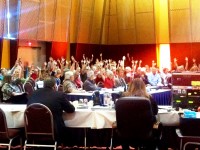The Oregon Department of Transportation is slated to subsidize oil and coal transportation infrastructure and it’s up to Governor Kitzhaber and the Oregon Transportation Commission (OTC) to block this gross misuse of public funds. Subsidizing coal export and crude oil shipping is not an appropriate use of ConnectOregon funds. The Oregon Transportation Commission should not approve applications to re-build the dock at Port Westward and alter the rail infrastructure along A-Street in Rainier because ConnectOregon funds should not subsidize coal and crude oil shipping.
The OTC’s official public hearing on the subsidies, known as ConnectOregon funds, occurred on Thursday, July 17, 2014 in Salem. The room at the Salem Convention Center was packed with over 250 people, many in red shirts indicating their opposition to coal export and oil-by-rail. The hearing lasted over six hours and was largely filibustered by a block of port officials and other officials who supported subsidizing coal and oil.
The OTC sat and listened, without dinner or bathroom breaks, through hours of testimony about these controversial applications. Most took notes as citizens spoke. Complimentary convention center coffee fueled many of us, as we did not anticipate the filibuster administered by port officials and county commissioners from across the state. They urged the OTC to turn a blind eye to the commodities that are benefiting from these subsidies. One official actually encouraged the OTC to not make any distinction between a train carrying crude oil and a train carrying teddy bears.

Highlights from the six-hour hearing include:
- Representatives from three community groups in Columbia County (the county slated to receive the ConnectOregon funds and fossil fuel terminals) gave outstanding testimony about why their region should not become a ‘sacrifice zone’ for dirty industrial development.
- The Eugene and Portland Ragin’ Grannies singing their testimony opposing handouts to coal and oil companies.
- Insightful testimony from nurses, doctors and health professionals about the long term public health impacts of allowing the coal and oil industry to set up shop in Oregon.
- Powerful testimony from two youth UN climate ambassadors urged the OTC to deny these applications and consider climate change as criteria for funding.
- A commercial fisherman on the Columbia gave his testimony by describing the salmon fishing industry and how much it relies on the Port Westward area. An oil spill at Port Westward would devastate his job.
The OTC will spend the next month considering the public comments and reviewing the 37 applications recommended for approval, including the three controversial subsidies for coal and oil infrastructure. The OTC will announce their decision on this controversial funding at the August OTC hearing in Ontario, Oregon, less than a handful of days after the Oregon Department of State Lands is slated to announce a permit approval or denial of Ambre Energy’s coal export permit (a removal/fill permit for dock construction) at the Port of Morrow.
If you haven’t submitted your comment, take 30 seconds and do it now! Their decision to either supply $7 million in public money to coal and oil transportation infrastructure or to direct these funds to the dozens of other grant applications that would better connect Oregon will shape the future of our region and our global climate.
Funding dirty energy projects would detract from the goals of the ConnectOregon program. Ambre Energy needs the dock upgrade at Port Westward for their polluting coal export proposal and subsidizing the expansion of crude oil shipping at Port Westward will increase dangerous crude oil unit train traffic through communities in the Gorge, Portland, and Columbia County, further impairing transportation connectivity for real Oregonians. The primary purpose of the A-Street rail construction is to increase the speed and number of crude oil unit trains traveling through downtown Rainer, Oregon.
It’s time to for the denial of the three coal and oil ConnectOregon grant applications. Take your stand now.
Read the Power Past Coal press release for the public hearing


